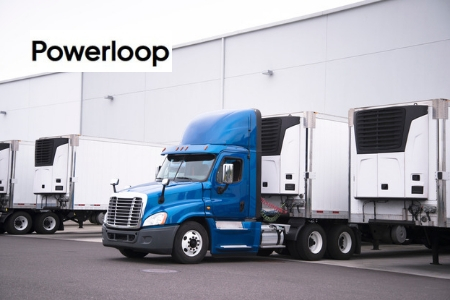Uber Freight introduces “Powerloop” trailer pool system
Uber Freight is going through some new transformations with its latest affiliate: Powerloop.
Moving beyond matching carriers to shippers, Powerloop is a reimagining of the trailer pool model. Sarah Abboud, who is the senior comms officer for Uber Freight, gave an overview of the trailer pool system:
“Trailer pools are groups of pre-loaded trailers that carriers can both pick up and drop off at shipper facilities. Decoupling the power unit from the trailer allows for loading and unloading to happen without the driver present, which in turn lowers costs and limits waiting time or shippers and drivers alike. Drivers running power-loads through trailer pool programs are able to spend less time waiting around at a facility and more time on the road moving freight. Unfortunately, the majority of trucking companies can’t participate in these programs because they don’t have the resources to purchase multiple trailer assets and instead rely on live loads to build their businesses.”
Traditionally, trailer pools have been the sole realm of the top 10% of carriers. Industry data states that 90% of freight carriers have less than six units, which means that they just aren’t big enough or, as Abboud states, they simply don’t have the resources to build the right partnerships with shipping companies. Abboud explained how Powerloop is helping to remove these obstacles:
“By renting trailers, Powerloop is lowering the barrier to entry to trailer pool programs and unlocking access to drop freight for trucking companies of all sizes. Carriers leveraging the Powerloop program are able to find backhauls more frequently and spend the majority of their day seamlessly moving through the network instead of constantly searching for their next load.”
The trailer pool they’ve created is available to all commercial carriers, no matter their size. A single driver with a lone power unit will have the same opportunities as a small to medium enterprise running several vehicles. Carriers will be able to rent a fully loaded trailer for $25 a day. This eliminates the expensive charges historically associated with being part of a large trailer pool. All commercial truckers have to do is ensure they are registered with Uber Freight. Once they’ve passed this process, they can sign up for Powerloop.
As the freight industry changes and grows, it’s no surprise to see companies like Uber becoming heavily involved. Uber has a vested interest in expanding its ventures, as it plans to go public in 2019. Uber Freight was the first step into the world of trucking, allowing drivers and carriers to use the app to connect with shippers for their next load. Powerloop is the next step and is all about renovating the trailer pool model and making it more accessible.
Freight is a great choice for the ever-expanding Uber to dip their toes in. The American Trucking Association reckons that despite often being perceived as unprofitable, revenue from the trucking industry accounts for around 80% of a massive $900 billion dollars generated by freight in 2017. That figure is likely to grow year on year, and maybe Uber will have a hand in that if they can help the smaller, independent carriers get more work with more well-known shipping companies.
Companies already using Powerloop include Fortune 500 giants such as Anheuser-Busch, the famous beer company. In a statement, vice president of logistics procurement Ties Soeters said, “At Anheuser-Busch, we believe that a universal trailer pool program, such as Powerloop, is an innovation that is long overdue for the industry. We have been working with Uber for a number of months trialing Powerloop and are already seeing the benefits this model can bring. We believe universal trailer pool programs have the capability to fundamentally improve the whole supply chain and deliver a win-win for all involved: less carrier investments in assets, more miles for the driver through shorter wait times and greater operational performance for the shipper.”
Currently Powerloop is only available in Texas, but in the same way that Uber Freight began there then expanded nationwide, expect to see Powerloop trailer pools available around the country sometime in 2019. It’s unknown how many trailers Powerloop has access to but the company disclosed that it was somewhere in the hundreds and Uber are leasing them from an undisclosed company.
The main benefits for drivers are potentially less time waiting while trailers are loaded and unloaded, plus less downtime between jobs. Uber Freight’s program manager, Max Pike, looks after special projects such as Powerloop and stated, “Given the current capacity crunch and the electronic logging device mandate, drivers’ hours are more important than ever. Carriers are focused on spending as much time as possible on the road moving freight, and not sitting at shippers’ and receivers’ facilities.”
Kofi Asante, head of the Powerloop product strategy added, “Because of Powerloop, now we’re able to unlock a lot of this drop-freight volume that originally we weren’t able to do. These ‘power-only’ loads also can give small carriers greater flexibility by removing limitations based on what trailers they have. You now have an opportunity to choose the loads that work the best for your day.”






